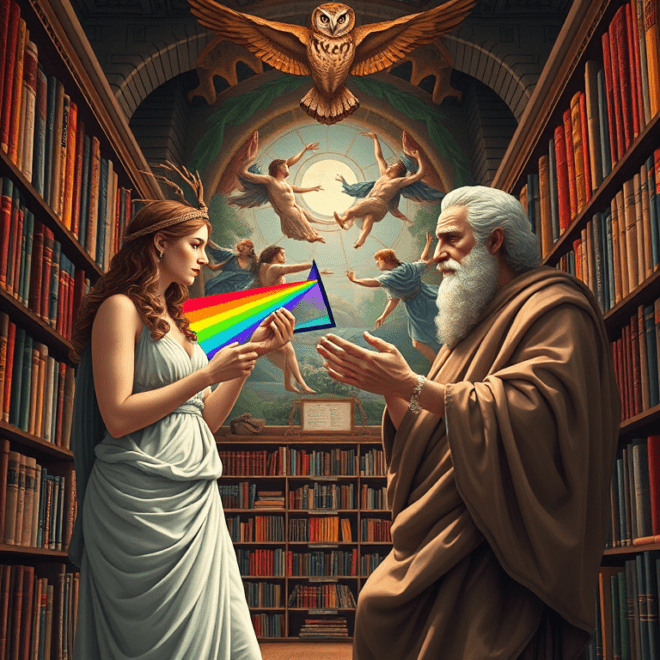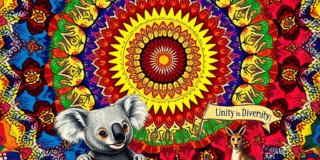
Abstract
Dialectic, a method of argument and reasoning, serves as a powerful tool for understanding the complexities of thought and existence. This paper explores the intricate relationship between dialectic and imagination, arguing that the latter is essential for the former to function effectively. Through the lens of “double-seeing,” we will examine how imagination enables us to perceive paradigms through images, allowing for a nuanced understanding of identity within difference. By maintaining the tension between polarities while recognising their commonality, we can achieve a purification of thought, leading to deeper insights in both dianoetic and dialectical reasoning.
Introduction
The concept of dialectic has been a cornerstone of philosophical inquiry since the time of Socrates, who emphasised the importance of division (diairêsis) and collection (sunagôgé) in the pursuit of knowledge. At its core, dialectic is about navigating the tension between opposites and finding unity within diversity. However, this process is not merely a logical exercise; it also requires a rich engagement with the imagination. This paper will argue that imagination plays a crucial role in dialectical thinking by facilitating a “seeing as” approach, which allows for the simultaneous recognition of commonality and difference.
The Nature of Dialectic
Dialectic can be understood as a dynamic interplay between opposing ideas or forces. It is a method of inquiry that seeks to uncover deeper truths by exploring contradictions and tensions. As Socrates suggests in Plato’s “Phaedrus,” the ability to see the natural unity and plurality of things is akin to divine insight. This perspective underscores the importance of recognising both the harmony and discord present in opposing concepts.
The Role of Division and Collection
In dialectical reasoning, division involves breaking down complex ideas into their constituent parts, while collection seeks to synthesise these parts into a cohesive whole. This process is inherently imaginative, as it requires one to envision relationships and connections that may not be immediately apparent. The act of dividing and collecting is not simply a logical procedure; it is a creative endeavor that relies on the imagination to see beyond the surface.
Imagination and the Double-Seeing
Imagination allows individuals to engage in what can be termed “double-seeing,” a process where one perceives an object or idea as something other than what it is. This “seeing as” approach is essential for dialectical thinking, as it enables the recognition of identity within difference. The image, while not the paradigm itself, can evoke similarities that illuminate deeper truths.
The Identity-Within-Difference Structure
The phrase “identity within difference” captures the essence of dialectical reasoning. It acknowledges that while two concepts may appear distinct, they can share underlying similarities. This structure allows for a richer understanding of complex ideas, as it emphasises the interconnectedness of seemingly opposing forces. Imagination plays a vital role in this process, as it enables individuals to envision these connections and engage with them creatively.
The Purification of Thought
The dialectical process also involves a purification of thought, which entails the separation of falsehoods from truths. This purification requires the ability to hold opposites in tension, recognising their fundamental discord while also appreciating their commonality. The imagination is crucial in this endeavour, as it allows for the simultaneous acknowledgment of differences and similarities.
Maintaining Opposites in Accord
The ability to maintain opposites in accord is a hallmark of sophisticated thinking. It reflects a deep understanding of the complexities of existence, where polarities coexist and interact. This perspective aligns with the notion of “metaphorical vision,” where one can see the interconnectedness of disparate elements. Such vision is essential for achieving a balanced and nuanced understanding of any subject matter.
The Imagination’s Role in Dianoetic and Dialectical Thinking
Dianoetic thinking, which pertains to the rational and logical aspects of thought, also benefits from the imaginative engagement that dialectic requires. The interplay between reason and imagination fosters a more holistic approach to understanding. Without the imaginative capacity to engage in double-seeing, the dialectical process would be significantly hindered.
Socratic Wisdom and the Divine Vision
Socrates’ assertion that those capable of seeing the natural unity and plurality of things are akin to gods highlights the elevated status of such individuals. This divine vision is not merely a gift; it is a cultivated skill that arises from a deep engagement with both imagination and reason. By practicing dialectical thinking, individuals can develop their capacity for double-seeing, enhancing their ability to navigate complex ideas and relationships.
Conclusion
The relationship between dialectic and imagination is both profound and essential. The process of double-seeing, facilitated by the imagination, allows for a richer understanding of identity within difference. By maintaining the tension between opposites while recognising their commonality, we achieve a purification of thought that is crucial for both dianoetic and dialectical reasoning. As we continue to explore the complexities of thought and existence, we must acknowledge the vital role that imagination plays in shaping our understanding of the world.
References
1. Plato. (n.d.). Phaedrus. Translated by Christopher Gill.
2. Hegel, G.W.F. (1977). The Science of Logic. Translated by George di Giovanni. Cambridge University Press.
3. Gadamer, H.G. (2004). Truth and Method. Continuum.
4. Ricoeur, P. (1991). From Text to Action: Essays in Hermeneutics II. Northwestern University Press.
5. Vico, G. (1990). The New Science. Translated by Thomas Goddard Bergin and Max Harold Fisch. Cornell University Press.



